Reaction word bank is a tool used in finance. It helps people describe market changes. The bank has words to explain how prices move. It makes talking about money easier.
Have you ever felt lost when hearing finance talk? You’re not alone. Many find money words confusing. That’s where its come in handy.
These special word lists make finance simpler. They give you words to use about market shifts. In this article, we’ll explore it. We’ll see how they help in the world of money.
What is a Reaction Word Bank?
A reaction word bank is a list of words. These words help describe financial changes. They are used to talk about how markets move. It makes it easy to explain money matters.
People in finance use it often. It helps them tell others about market trends. The words in the bank are simple but powerful. They can show if things are good or bad in the money world.
It is like a special dictionary. But it’s just for finance talk. It has words that fit many situations. This helps people understand complex money ideas better.
Why Use a Reaction Word Bank?
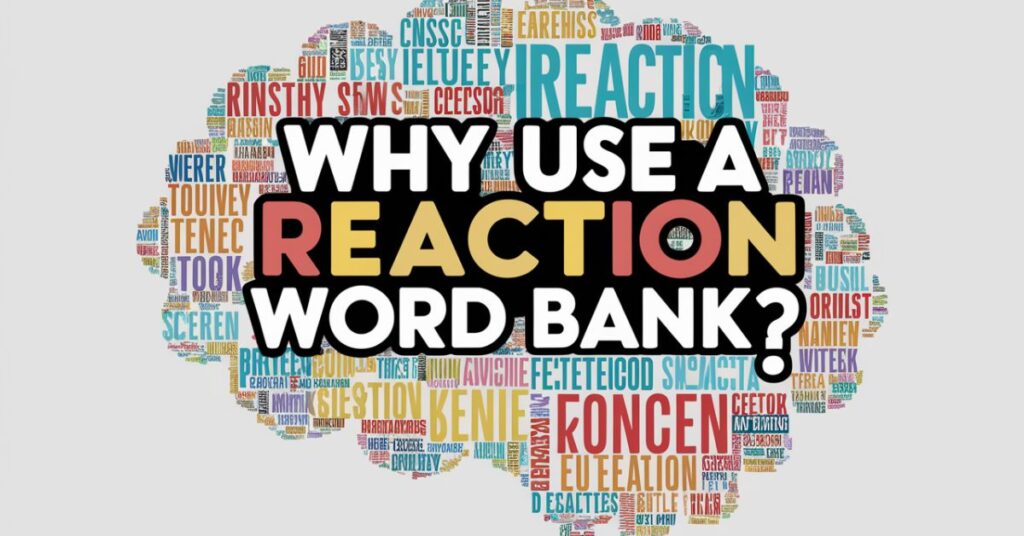
Using a reaction word bank has many good points. It helps people talk about finance clearly. When everyone uses the same words, it’s easier to understand each other. This is why it is so helpful.
It also saves time. Instead of thinking of words, you can pick from the list. This makes talking about money faster. It’s especially good when markets change quickly.
Another reason to use it is to avoid mistakes. Some finance words can be tricky. The bank gives you safe words to use. This way, you don’t say the wrong thing about money matters.
Common Words in a Reaction Word Bank
It has many useful words. Let’s look at some common ones:
- Bullish: This means prices might go up.
- Bearish: This means prices might go down.
- Volatile: This means prices change a lot.
- Stable: This means prices don’t change much.
- Surge: This means prices go up fast.
How to Use a Reaction Word Bank?
Using it is simple. First, pick words that fit the situation. Look at how the market is moving. Then choose words from the bank that match. This helps you describe finance clearly.
Practice using it often. Try it when you read finance news. Use it to talk about money with friends. The more you use it, the easier it gets. You’ll use these words without thinking.
1. Understanding the Context
Before using a reaction word bank, know the situation. Different words fit different times. It has options for many cases. Pick words that match what’s happening in the market.
2. Choosing the Right Words
When you use the reaction word bank, pick carefully. Some words are stronger than others. It offers mild and strong choices. Think about how big the market change is. Then choose a word that fits.
3. Practice Makes Perfect
To get good at using it practice. Try using the words in sentences. The more you use it, the easier it gets. Soon, you’ll use the words without thinking.
4. Staying Updated
Markets change, and so does language. Keep your reaction word bank current. New words might join the list. Old ones might not be used as much. Staying updated helps you use it well.
5. Combining Words
Sometimes, one word isn’t enough. It lets you mix words. This helps describe complex situations. Learning to combine words from it is a useful skill.
Benefits of Using a Reaction Word Bank
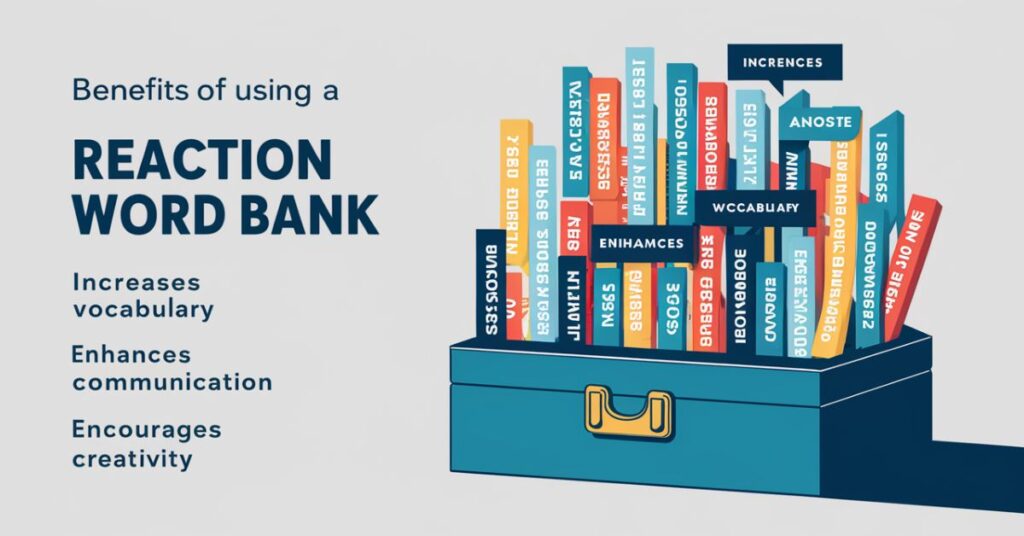
Using a reaction word bank has many good points. It makes talking about finance easier. People who use it often feel more sure of themselves. They can join money talks without fear.
It also helps avoid confusion. When everyone uses the same words, there are fewer mix-ups. This is very important in finance. Small mistakes can cost a lot of money.
Another good thing about it is learning. As you use it, you learn more about finance. The words in it teach you about market moves. This knowledge can help you make better money choices.
Reaction Word Bank in Different Finance Areas
It is useful in many parts of finance. It helps in stocks, bonds, and foreign exchange markets. Each area uses it in its own way. The words change to fit what’s happening in that market.
In stocks, it might focus on company performance. For bonds, it could have words about interest rates. Forex traders use it to talk about currency shifts. It adapts to each finance area’s needs.
1. Stock Market
In the stock market, it is very useful. It helps describe how stock prices move. Words from the reaction word bank can show if stocks are doing well or not. This helps investors make choices.
2. Forex Trading
Forex traders use it a lot. Currency markets change fast. It gives quick ways to describe these changes. This helps traders talk about market moves easily.
3. Cryptocurrency
It is important in cryptocurrency too. This new market needs clear words. It provides terms for crypto price changes. It helps people understand this complex area.
Creating Your Own Reaction Word Bank
Making your own reaction word bank can be helpful. Start with common finance words. Add words you hear often in money talks. Your personal reaction word bank will grow over time.
As you learn more, add to your reaction word bank. Include words that fit your finance interests. You might have words for stocks, bonds, or other areas. A personal reaction word bank helps you remember important terms.
Remember to keep your reaction word bank simple. Don’t add words you won’t use. The best reaction word bank is one you can use easily. It should help you, not confuse you.
Reaction Word Bank for Beginners
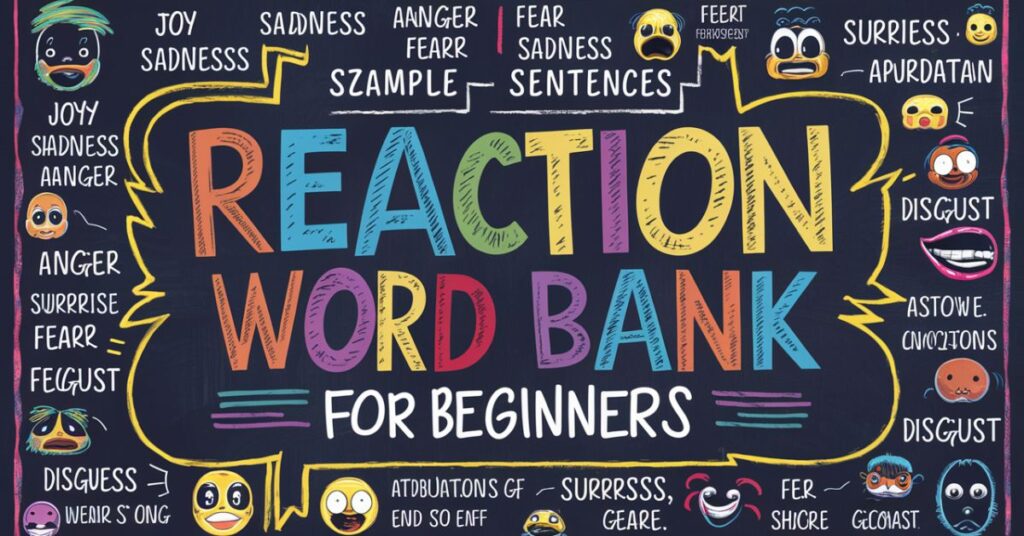
If you’re new to finance, start with a basic reaction word bank. Learn a few key words first. Words like “up,” “down,” “fast,” and “slow” are good to start. These simple words from the reaction word bank still say a lot.
As you get more comfortable, add to your reaction word bank. Learn words that describe bigger changes. Words like “crash” or “boom” might join your list. It grows with your knowledge.
Don’t worry if you don’t know all the words right away. Building a good reaction word bank takes time. Keep learning and adding words as you go. Soon, you’ll have a useful reaction word bank.
Advanced Reaction Word Bank Usage
For experts, it can be very detailed. It might have words for tiny market moves. The advanced reaction word bank helps describe complex situations. It’s useful for in-depth finance talks.
An advanced reaction word bank might have special words. These could be for specific market events. Or they might describe unusual price patterns. These words help experts talk about tricky finance topics.
Using an advanced reaction word bank takes practice. But it’s worth it for people who work in finance. It helps them share ideas clearly. A good reaction word bank makes complex topics easier to discuss.
Read this article: How to Send Money to Pakistan from the USA MCB Bank?
Reaction Word Bank in Financial Reports
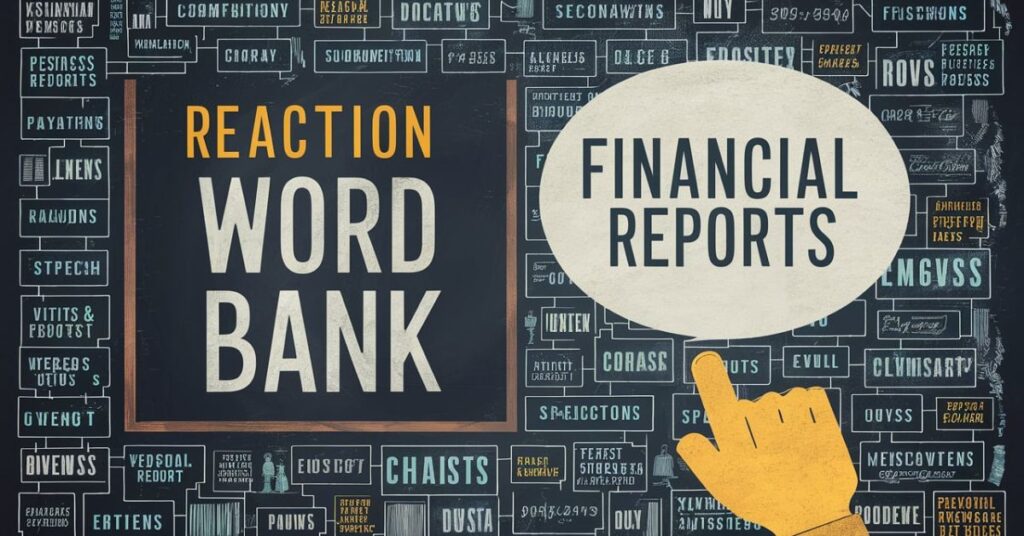
Financial reports often use words from it. These reports talk about how companies are doing. It helps make these reports clear. It gives simple ways to describe money matters.
Writers of financial reports like it. It helps them explain things without using too many words. It makes reports easier to read. This is good for people who need to understand company finances.
Investors also like when reports use it. It helps them quickly see how a company is doing. The words from it give clear pictures of financial health. This helps people make smart choices with their money.
Teaching Finance with a Reaction Word Bank
Teachers use it to help students. It makes learning about money easier. It gives students words to use when talking about finance. This builds their confidence.
Using it in class is fun. Teachers can make games with the words. Students can practice using it in pretend market situations. This helps them remember the words better.
It also helps students understand news. They can read finance news and know what it means. The words they learn from it appear in real stories. This makes finance feel more real to them.
Future of Reaction Word Banks in Finance
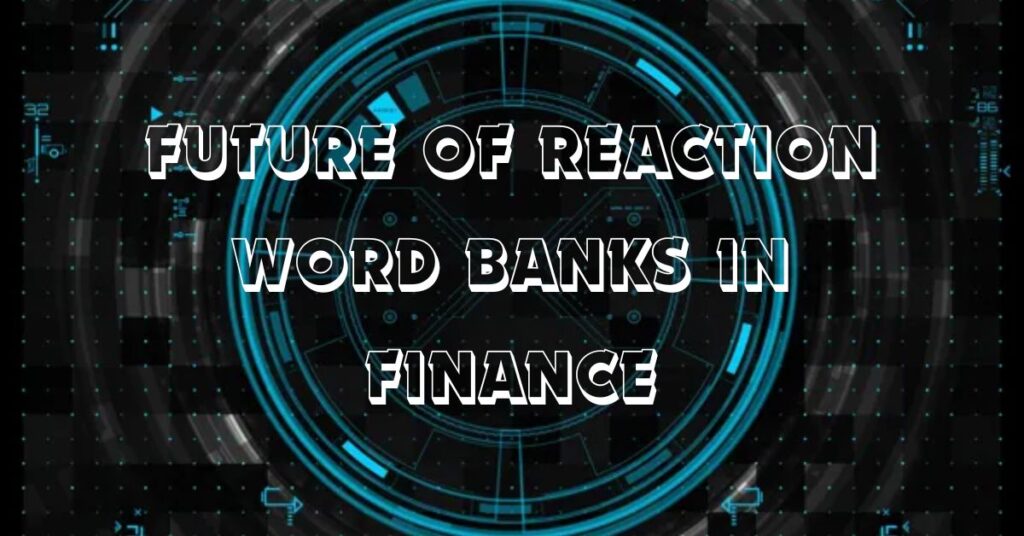
It will keep changing. New words will join as markets change. It might grow to include words for new types of trading. It will always help people talk about money clearly.
Technology might change how we use it. Apps could suggest words as you type. This would make using it even easier. It could help more people join finance talks.
As finance gets more global, it might too. It could include words from many languages. This would help people from different countries talk about money. It could bring the finance world closer together.
Final Words
The reaction word bank is a powerful tool in finance. It helps people talk about money matters clearly. From beginners to experts, everyone can benefit from using it. It makes finance less scary and more accessible.
As we’ve seen, it has many uses. It helps in personal finance, professional settings, and education. It is always growing and changing. It keeps up with the fast-moving world of finance.
The best way to learn is by using it. Start with simple words and grow your list over time. Soon, you’ll find yourself comfortable in any finance conversation. It is your key to understanding the language of money.
Frequently Asked Questions
What is a reaction word bank in finance?
It’s a list of words used to describe market changes. It helps people talk about finance clearly.
How can I start my own reaction word bank?
Begin with basic finance terms. Add words as you learn more about markets and money.
Are reaction word banks only for experts?
No, anyone can use it. There are simple words for beginners and complex ones for experts.
Can reaction word banks help with investing?
Yes, they can help you understand market news. This can aid in making informed investment decisions.
How often should I update my reaction word bank?
Regularly update it as you learn new terms. Also, check for new finance words that become common.

David: Seasoned financial expert with 5 years in banking and investments.
Skilled in personal finance, market analysis, and wealth management. Empowers clients to achieve financial goals.





